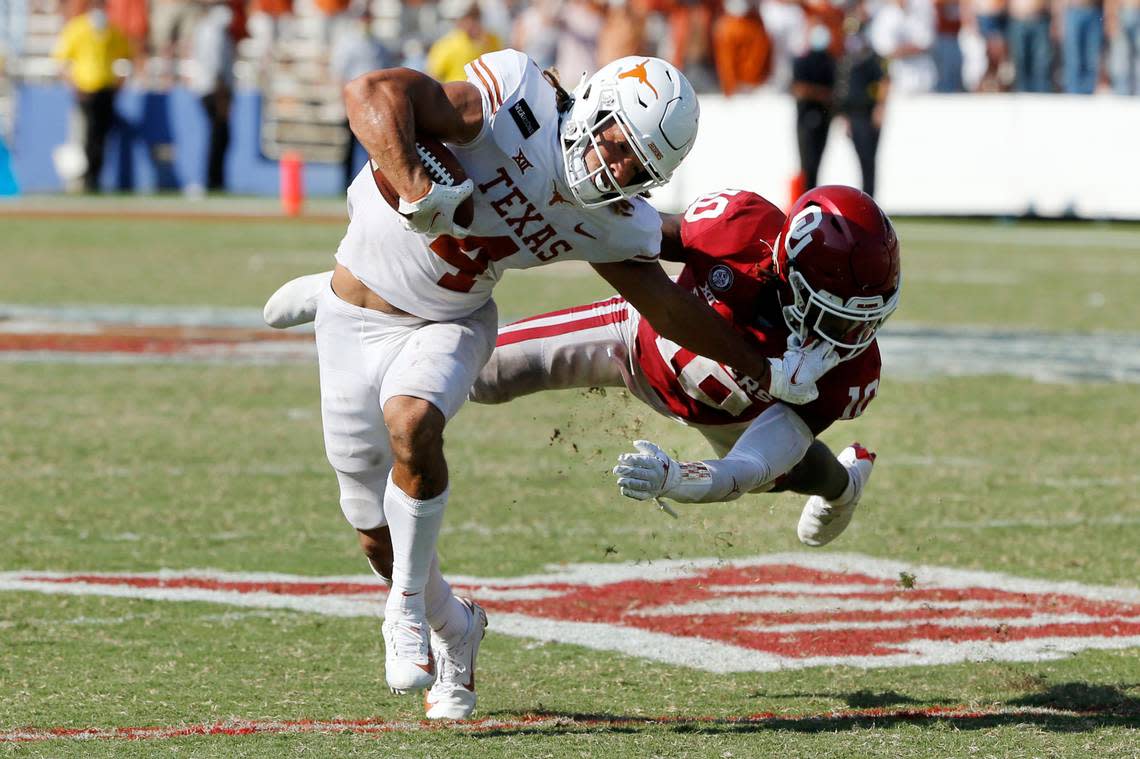Texas A&M’s fight to stop Texas’ move to SEC would be another Aggies loss | Opinion

There remains mostly confusion among college athletic administrators concerning the report that Texas and Oklahoma plan toabandon the Big 12 conference and join the SEC.
Since the only comments on the record about the report published by the Houston Chronicle’s Brent Zwenerman on Wednesday are soft denials, zero is official.
Don’t be surprised if UT and OU make this announcement in a few weeks. Don’t be surprised if they don’t.
Texas and Oklahoma could actually plan to notify the Big 12 that they intend not to extend their media rights with the league when they expire in 2025, according to WFAA’s Jason Whitely.
Or, at least according to one high-ranking source, that is not true. And that all of this conversation never was about Texas and Oklahoma leaving the Big 12, but rather the re-forming of the NCAA itself.
Amid the dramatic changes on going in college athletics, NCAA president Mark Emmert said last week that the governing body needs to “re-think” how everything works, including decentralizing college sports.
While UT and OU’s exit may be inevitable, this feels more like a first step in the formation of a super league, and the consolidation of wealth in college sports where the biggest brands keep the money among themselves.
News of these discussions caught people from College Station to Waco to Fort Worth by surprise, which is why some of them are leery of the specifics. They think they would have heard at least a word of it.
But the reason they never would have gotten wind of it is because these conversations are happening higher up on the food chain, between state political figures in Oklahoma and Texas rather than in athletic departments.
There will be considerable political backlash, and fighting, on both sides of the Red River if the two plan to leave. And there will be nothing Baylor, TCU or Texas Tech can do to stop it.
Sorry, Baylor, but Ann Richards ain’t walkin’ through that door.
Oklahoma State may have a puncher’s chance to make life difficult for Oklahoma to leave without it, but it’s hard to see the good folks in Stillwater stopping this without the late T. Boone Pickens.
Much like when Texas and Oklahoma flirted with the idea of leaving for the Pac-12 conference 10 years ago, the “hated rivals” are simply looking where they can increase revenues.
Expansion in the SEC requires 11 of the current 14 schools to approve the move, and there are two that would oppose it — Missouri and Texas A&M.
Of the many games A&M has played Texas, this will be the biggest, and ultimately the Aggies will lose this one.
No one associated with Texas A&M wants this move for the obvious reasons. Texas A&M athletic director Ross Bjork said as much during SEC Media Days.
A&M has created its own identity as the only member of the SEC in Texas. It’s given them a feeling of superiority in their endlessly entertaining cat fight.
The Aggies are prepared to fight the good fight, but, much like when A&M was a member of the Big 12, what the Aggies say won’t matter much when it comes to Texas.
Somewhere you know former UT athletic director DeLoss Dodds is having a good laugh over this.
Texas can’t beat Iowa State in football, but Bevo is one of the most powerful brands in college athletics. More so than Texas A&M.
If Texas wants the SEC, and the SEC wants Texas, then that’s a wrap. League commissioner Greg Sankey will convince — or force — the Aggies to deal with it.
The rest are just details in a contract that will be handled by lawyers, and by ESPN. The Longhorn Network, whose creation was the driver for A&M to leave the Big 12 for the SEC in the first place, will not be a problem.
ESPN owns both the SEC Network and The Longhorn Network.
They will figure this out, and there will be nothing Texas A&M can do to stop it.

